Exploring Other Forms of Female Genital Alteration

April is Sexual Assault Awareness Month (SAAM), a time dedicated to raising awareness about sexual violence and advocating for survivor support and prevention. This campaign seeks to open the conversation by addressing unacknowledged forms of female genital alteration. These harmful practices or procedures, while not always classified as female genital mutilation/cutting (FGM/C), share similarities in their negative impact on bodily autonomy, health, and well-being. Through this social media series, Sahiyo aims to amplify awareness within the broader discussions surrounding gender-based violence, consent, and bodily rights. You’ll learn about: The different types of FGM/C and related harmful practices The impact of these procedures on bodily autonomy and health Current U.S. cases that involve medicalization and consent issues Further resources and ways to take action in the movement to end FGM/C Follow along on Instagram, Facebook, LinkedIn, X, and Threads! Related links: Khatna, Khafz or Female Genital Cutting: An Informational Brochure The forgotten history of female genital cutting in the United States Trauma and Female Genital Cutting: 7-Part Series
Engaging the Next Generation: A Conversation on Female Genital Mutilation/Cutting

By Katie Bai On Tuesday, February 18th, Sahiyo had the privilege of speaking to students at a Connecticut high school government class at the Academy of Information Technology & Engineering in Stamford, Connecticut (CT). Our presentation focused on the impact of female genital mutilation/cutting (FGM/C) on Connecticut communities, the urgent need for state laws, and ways students can actively engage in advocacy. We began our talk by introducing the history of FGM/C in the United States and then discussed the prevalence of the harmful practice in Connecticut. From there, we shared a survivor’s story from Sahiyo’s Voices to End FGM/C digital storytelling project, discussed the 2025 Bill that seeks to protect children from FGM/C, and concluded with ways in which students could get involved in addressing this issue. From the moment we began, it was clear that these students were deeply engaged and interested in what they could do to get a law passed in the state. The students demonstrated a strong grasp of both the policy landscape and the human rights implications of FGM/C. Their curiosity and critical thinking skills were evident as they asked about the legal gap between the federal ban on FGM/C and the state law, understanding that state laws must be comprehensive in protection for survivors and offer opportunities for education and outreach for communities. The students were also able to see the important role that cultural sensitivity plays in advocacy efforts, and they asked additional questions like: “Is there any correlation on the state level between FGM/C and abortion laws?”, “Are Latin American countries experiencing FGM/C or is there simply a lack of data?”, “Why did the CT bill to ban FGM/C die in 2018?” Seeing these young minds so eager to be part of the solution reaffirmed the importance of these conversations and the power of education in mobilization. One of the key takeaways from our discussion with the students was that FGM/C is not just an issue happening “somewhere else.” It is a concern within the state of Connecticut, impacting real people in ways that often go unnoticed. We amplified the importance of closing legal loopholes and ensuring that survivors and at-risk individuals of FGM/C have the protections and support they need at the state level. We hope any legislation in Connecticut will address these components. As presentation facilitators from Sahiyo, we left the Academy of Information Technology & Engineering feeling hopeful and energized by the students. If the students in this class are any indication of the next generation of leaders, the future looks incredibly promising – but only if we all take action to protect it. A huge thank you to the students and their teacher, Claude Morest, for welcoming our team to speak and for their commitment to learning about and addressing this critical human rights issue. At Sahiyo, we strive to continue conversations through education programs and advocacy efforts, building towards a future free from FGM/C. If you would like to support us, consider donating to support our work. Let’s keep the conversation going and work together toward a future free from FGM/C! Join us in safeguarding girls from FGM/C in Connecticut! Connecticut residents, sign our Call to Action.
Newly Released: Sahiyo’s Toolkit on Survivor and Community Engagement!
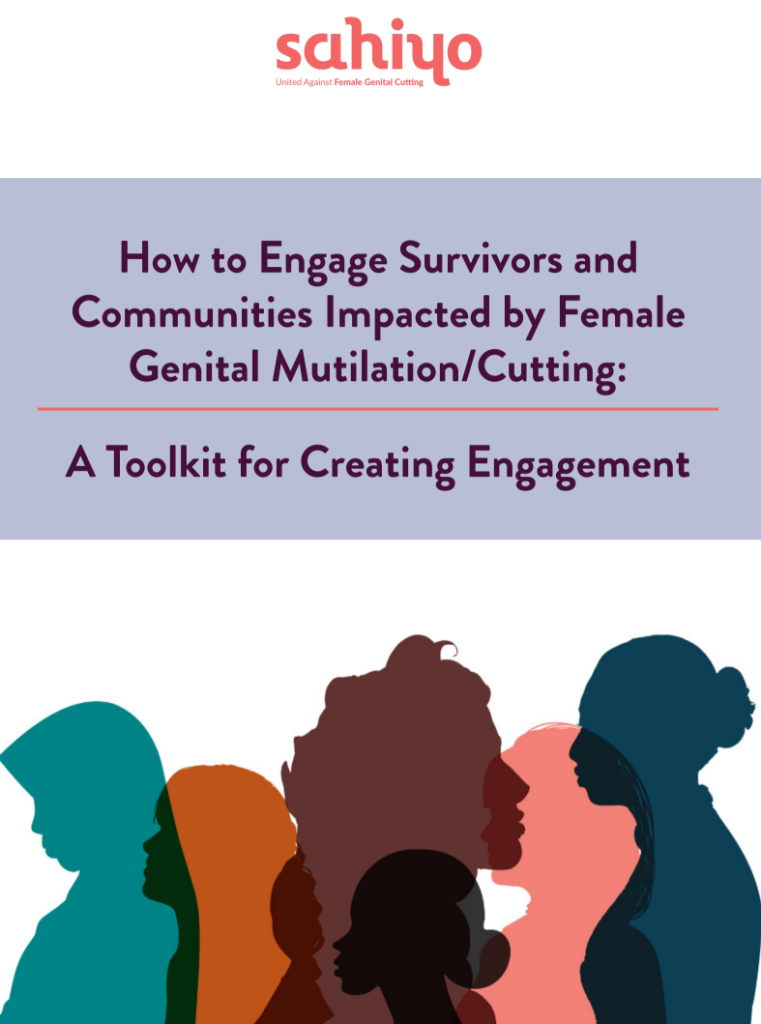
Here at Sahiyo, we believe that every individual and community impacted by female genital mutilation/cutting (FGM/C) deserves to be heard, supported, and empowered. That’s why we’ve created the How to Engage Survivors & Communities Impacted by Female Genital Mutilation/Cutting (FGM/C): A Toolkit for Creating Engagement (or Survivor & Community Engagement Toolkit, for short). A resource built for those on the front lines of prevention efforts, survivor advocacy, and community outreach. FGM/C is a deeply complex and culturally sensitive issue, which makes engaging with impacted communities challenging, but essential. This toolkit provides practical guidance and best practices for outreach, education, and support. It’s not just a collection of strategies; it is a product of lessons learned from real-world efforts across the U.S., gathered throughout 2023-2024 from grassroots organizations who have been working tirelessly to support survivors and prevent the practice of FGM/C. Why Survivor and Community Engagement Matters In the movement to end FGM/C and support those impacted by it,, engagement is key to progress. In our experience, and based on the insights shared with us from other organizations, we recognize that it’s not enough to just raise awareness—we need to connect, listen, and build trust with the communities impacted by FGM/C to fully engage on the topic. But what does “engagement” truly mean in this context? Engagement means showing up—not just as advocates or professionals, but as compassionate listeners, who seek to understand and not just respond. It is about actively connecting with and fostering understanding among a diverse group of individuals, including those who have experienced FGM/C, their families, friends, and even those who have not been directly impacted by FGM/C. Meaningful engagement creates spaces where survivors feel safe to share their stories, where their experiences are valued, and where they can contribute to solutions. It’s about bringing everyone into the conversation- men, adolescents, community leaders, elders, religious figures, teachers, and other local officials. The more voices we bring to the table, the stronger we become as a movement! “Unless you are engaged with the community, it’s very very hard to recruit women. They are culturally very sensitive. And they really don’t want to talk about it, about FGM/C, the harmful practice they have been through. For example, I am the impacted, the victim of FGM/C, I have the same experience as them and they feel comfortable to talk to me about it. They don’t trust you by the title, they trust you if you build a relationship with the community.” – Rufo Jiru, Anolee Sisters *This toolkit was completed on September 30, 2024. What’s Inside This Toolkit? We know that every community is unique, and we also know that addressing FGM/C requires multiple approaches that respect and reflect those differences within impacted communties. The toolkit is organized into sections that take you step-by-step, identifying the best ways to engage, support, and collaborate with the communities you serve. Here’s a glimpse of what’s inside: Survivor and Community Engagement – An Overview: Gain a holistic understanding of community and survivor engagement. Reviewing why it is important and how it makes a difference. Ethical and Cultural Considerations: Learn how to approach FGM/C with respect and cultural sensitivity. This section provides guidance to ensure mindful interactions. Strategies to Conduct Survivor & Community Engagement: Discover different methods to connect with and support individuals and communities impacted by FGM/C. Review case studies in which organizations share their experiences with community engagement and lessons learned. Decision-Making in Program and Event Planning: Understand that every community is unique. Learn ways to adapt various forms of engagement to suit the specific needs and contexts of each community. “Community engagement is very important because a lot of our clients face a lot of barriers to getting services. So creating those outreach and educational community events that we do in different apartment complexes here in Columbus, where most of our refugee and immigrant clients live, provides an opportunity for us to be in the neighborhoods, be where our clients live, and help introduce them to the different services that we have at US Together.” – Hana Adelbaki, US Together Who Contributed? This toolkit is a collaborative effort, drawing on insights from individuals affiliated with organizations working in the field of FGM/C prevention and advocacy. Their experiences provide valuable perspectives on addressing FGM/C across the United States. Insights are gleaned from the following organizations: African Cultural Alliance of North America (ACANA) African Family Health Organization (AFAHO) Anolee Sisters International Institute of Minnesota (IIM) International Survivors And Family Empowered (iSafe) Global Woman Peace Foundation (GWPF) Sahiyo Sauti Yetu Center for African Women, Inc. Nile Sisters Development Initiative (NSDI) The U.S. End FGM/C Network US Together Inc. Silence Speaks Their work, insights, and dedication make this toolkit what it is today—a resource created by the community, for the community.
How can you, as an ordinary person, help end female genital cutting?
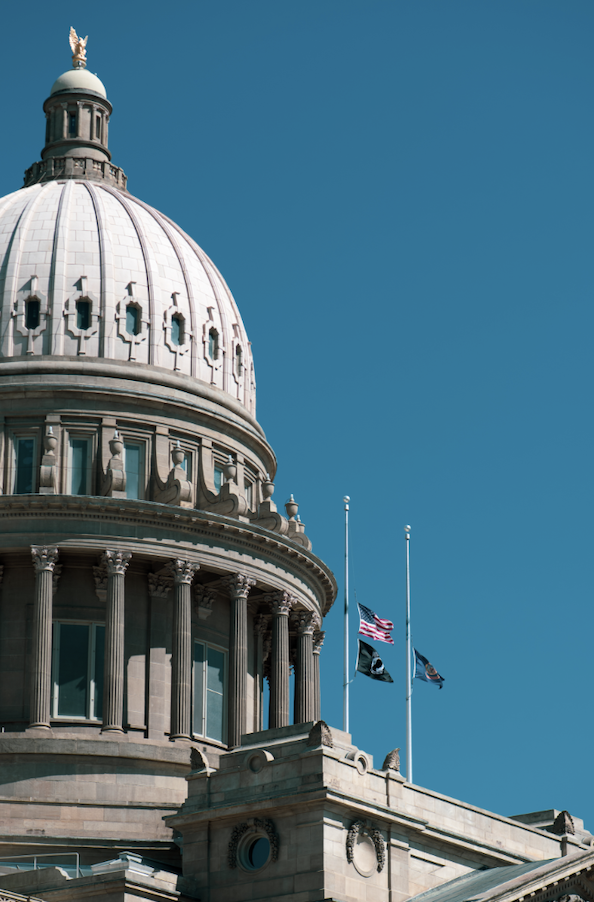
By: Sara Khattak We hear a lot of sayings about creating change. “You can make a difference” is a common phrase used to inspire people to become more engaged in the world around them. But that phrase isn’t always helpful. How do people actually make a difference? Most Americans rely on their elected officials to fulfill their promises to create change structurally in order to better our country. However, most Americans aren’t consistent voters. This makes it difficult to voice opinions through elected officials who may not be the best suited to represent their constituents. Therefore, it is important to not only become a voter but to be fully politically engaged. A few months ago, I attended a webinar hosted by API-GBV on advocacy and issues education, and I’ll be sharing what I learned from the session. One thing I learned for sure from the webinar is that, if you want to create visible changes on issues you care about, such as addressing female genital cutting (FGC) then you need to take action yourself. Here are some practical ways you can get involved politically in the movement to end FGC: 1. Contact your Elected Officials First, figure out who your local and state elected officials are, and what they stand for in terms of health, women’s rights, children’s rights, safety from violence, and other related topics. This website is a great place to start. Also, check this map to see if your state has laws against FGC. Next, consider all the possible opportunities that you may have to speak with your representative, this may include: town halls, civic activities, program tours, meet and greets, and congressional visits. Decide which one is best for your education and advocacy purposes. 2. Schedule a Meeting You can also schedule an in-person meeting with your representative. The process for setting up a meeting is slightly different depending on whether you are contacting a federal, state, or local level official: For your federal officials, you can check their schedule on senate.gov or the house.gov websites. After that, call and set up a meeting with your representative. The Capitol building’s phone number is 202-224-3121. Tell whoever is scheduling the meeting the following: “I am a constituent and would like to set up a meeting with my representative.” For contacting state or local officials, start with your state or town’s legislature’s website. They should also have a calendar and a point of contact for specific representatives. A few of the good days for setting up meetings are on Mondays and Fridays during the legislative recess, but be sure to also check the legislative calendar for additional availability such as non-voting days, days when committees aren’t meeting, or office hours. 3. Know Your Talking Points: When preparing for your one-on-one meeting, keep in mind a few key points: First, focus on the key message that best supports your position. End FGM Network, the Connecticut Coalition to End FGM/C, and the Washington Coalition to End FGM/C all have a plethora of resources you can reference when it comes to discussing FGC. Make a specific request, such as supporting or introducing legislation against FGC. An effective method to convey your message is by giving testimony. Testimonies, such as this one from the Washington Senate Hearing at the 54 minute mark, will help to humanize the issues that you are advocating for. A recording of a testimony is a video of someone giving a formal statement or providing evidence during an official government hearing. If there’s a specific bill being considered, you can submit written testimony to the relevant committee. You could also highlight any organizations that offer program activities relevant to your cause. Bringing written materials can also be very helpful in reinforcing your message; make sure to bring extra handouts to leave behind with the representative. Most importantly, do your homework on government officials beforehand. Share personal stories to make your issue more relatable and make a specific request of your representative. This might be the first time your representative has ever heard of FGC. Note any programs in your state that help with advocacy or supporting survivors, and what further support is needed. If you are uncomfortable sharing personal stories connected to FGC and those who you know are connected to it, the Voices to End FGM/C website is a great resource for showcasing how FGC impacts individuals globally. The power of storytelling in helping survivors heal and educate people on FGC is a vital tool in legislative advocacy. These stories help explain to legislators that FGC is impacting their constituents in their districts. Finally, leave time for questions and be sure to say thank you at the end of the meeting. Avoid guessing about information if you’re unsure. If you don’t know something, let them know you can follow-up with additional information addressing the question. Overall, stay on point as these meetings tend to be short. 4. Ensuring continuous engagement and support Once you’ve had a successful meeting, remember to send a thank you note and follow up. By presenting yourself as a resource or point of knowledge on FGC, it will be easier for lawmakers and their staff to work with you. Throughout this entire process, you should monitor developments related to the issue and continue to communicate and advocate through other channels such as social media, public events, and other types of community gatherings. By spreading your message, you can garner more support from your community and engage stakeholders. Creating change may seem daunting at first, however, my main takeaway from the webinar is that advocacy becomes much more manageable once you develop a game plan and take that first step. Remember, don’t underestimate the power of one voice. While addressing the issue of FGC in the United States is complex, your individual efforts can make a significant impact. Whether it is contacting your representatives, raising awareness in your community, or supporting organizations working to end FGC, every action counts. The journey of advocacy
Interview with Zehra Patwa of the Connecticut Coalition to End FGM/C
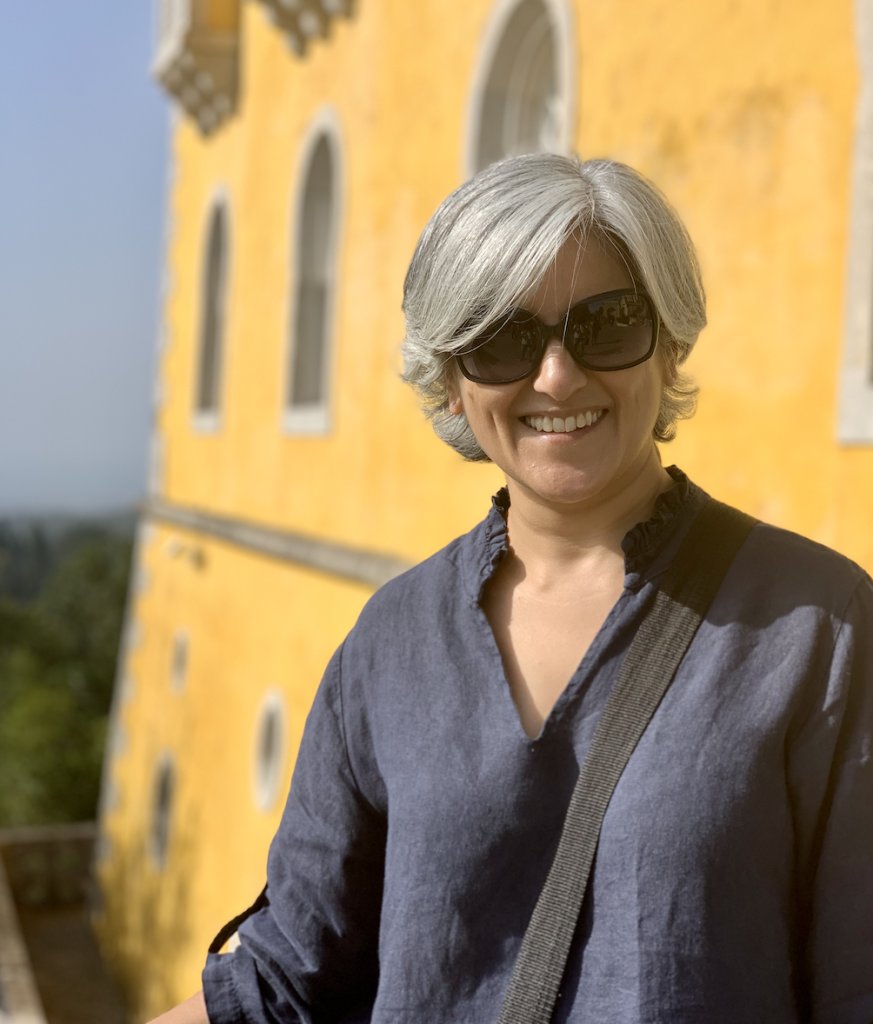
Recently, policy interns at Sahiyo have been interviewing members of the Connecticut (CT) Coalition to End FGM/C to learn more about its members and all the important work they contribute toward ending female genital mutilation/cutting (FGM/C). For the first two blogs, we interviewed Caitlin LeMay and Joanne Golden. In our third blog, Sahiyo’s policy intern, Juliet Shires, spoke to Zehra Patwa, Sahiyo U.S.’s Advisory Board Chair and co-founder of WeSpeakOut. When she was in her 40s, Patwa discovered that FGM/C was taking place in the Dawoodi Bohra community she belongs to. “I was shown an interview that my cousin had done for a TV documentary in Australia, talking about her experience of FGM/C in the Bohra community […] I thought ‘Oh, that’s terrible that she had to go through this.’ And at the end of the interview, she said that all the girls in her community had been cut and I could not even fathom that. The women [in my community] have always been highly intelligent, and progressive role models…so to hear that women in the community were doing this practice on young girls just blew me away. It took me a while to even accept that it was happening.” Then came another shock: Patwa learned that she had undergone FGM/C when she was just seven years old, but had no recollection of the event. She decided that she needed to do something to end the practice of FGM/C in her community and beyond. Her cousin invited her to join a WhatsApp group chat where she met the Sahiyo co-founders and Masooma Ranalvi, who would later co-found WeSpeakOut with Patwa. “I had to do something with this anger, with this shock, with all of these things I was feeling, and this lack of clarity that I had of what happened to me…I could not bear the thought that this was still happening to other girls. Part of the awfulness of this practice, for me, is that you don’t even give girls and women a chance, by cutting them…you risk so much pain, so much trauma.” A large part of her advocacy relates to her work with her own organization, WeSpeakOut, a partner of the CT Coalition and Sahiyo. WeSpeakOut is primarily focused on making FGM/C illegal in India, though it also works on other issues that impact women in the Bohra community. Their work involves research studies, petitions, and creating a legal framework for legislation banning the practice: “Because India is the seat of the Bohra community — that’s where the religious head is based — we figured if [FGM/C] was made illegal in India, then the Bohra diaspora all over the world would agree that the practice is illegal and would discontinue it. Sadly, passing a law in India involves many hurdles but we are seeing glimmers of social change in the community just by talking about this issue.” Patwa explains that speaking out has led to many conversations, many of which have highlighted how important education is in making meaningful changes against FGC: “When I started my activism in 2015, and started speaking out publicly in 2016 — which was terribly nerve-racking — so many people said to me, ‘Oh, I had no idea this happened here.’ I think people don’t realize how widespread this practice is. People want to know how many women and girls are cut…well, there’s no way of really knowing for sure, but it’s been estimated that there are more than 2,500 girls at risk in Connecticut alone, but the number is potentially much higher because it is such a clandestine practice. The states surrounding Connecticut have anti-FGM/C laws but Connecticut doesn’t, which makes our state a destination for cutting. [People I talk to often express surprise that] it’s a cultural practice, not a religious one.” She also emphasized the importance of empathy and understanding when creating legislation and advocating against the practice: “The parents who take their girls to be cut are not monsters…they’re being pressured into doing it because they’re told it’s the right thing to do by the trusted elders in their community. With education and the support of the law, parents can make an informed decision, backed by facts and others’ experiences, to protect their daughters.” Patwa expressed disappointment that a law has still not been passed in Connecticut, but remains hopeful: “It’s been disappointing that our bill has not made it into session three years in a row…it was a little disheartening at first but we are determined to continue working to pass this law because, even though we may not have huge numbers of girls at risk, we have some. And as far as I’m concerned, one girl cut is one too many. I know how much Connecticut cares about people and tries to do the right thing. I know in my heart that this law will be passed because it’s absolutely the right thing to do.” For people who would like to get involved in FGM/C activism, Patwa’s advice is simple: “Educate yourself, talk to people, reach out to people. Anybody at the Connecticut Coalition and at Sahiyo is very willing to help… And any organization that wants to become part of the coalition is welcome to lend their support: the more broad the coalition, the more helpful it will be to pass this law.” Patwa’s own experience with the Connecticut Coalition and the support it has received has strengthened her belief that FGM/C can end. “I truly appreciate all the allies who work to help survivors and prevent this practice. The Connecticut Coalition is now huge — there are many organizations involved. It’s heartening to have so many allies, who may not be from FGC-practicing communities, but who understand that there are so many different ways that they can help. It makes me tear up thinking about how much people care about others with different experiences from themselves. It gives me hope that we will see the end of this practice in my lifetime.” We would like to thank Zehra
Male Engagement within the Movement to End FGM/C: From Conversation to Connection: Creating a dialogue between men and women on FGM/C

By: Bakahn Jamal Talking about FGC with others is not always easy, especially when speaking to men about the subject. Over the month of June, Sahiyo held an awareness campaign in honor of Fathers day, highlighting the importance of engaging in conversations with men about FGC. In connection with that campaign, Sahiyo reached out to Bakahn Jamal, a Project Supervisor for Wadi, an organization promoting self-help programs in the Middle East. A large part of her work is going to rural communities and creating dialogues with local leaders about the dangers of FGC. Below, Bakahn shared her experiences and advice for engaging in conversations with men about FGC, and why those conversations are critical to the movement to end FGC. 1. How did you start initiating dialogue with men about FGM/C? When working with women regarding the topic of FGM and [its consequences] – such as intimacy and sexual issues – women will tell us that we should also speak with their husbands about the implications of FGM because “he does not understand why I might act or feel in certain ways.” Through these conversations, we realized the importance of involving men in a dialogue about these issues. That is how we started working with men — by asking them what their knowledge of FGM was and also asking them how they felt about the practice. From there, we were able to ask them to help advocate to end the practice in their own communities. 2. What has been your experience engaging with men about the practice in their communities? The subject of FGM with men is always tricky because one will not know what to expect. Traditionally, FGM is considered “woman’s territory,” meaning men will avoid talking or associating themselves with such conversations about the practice. Most men will immediately shut down such conversations, and some will even get embarrassed or aggressive, but one thing for sure is that they have little to no knowledge about the practice itself. This is why including education within our advocacy work with men is so important because it leads to more productive conversations. 3. Has this experience been positive or negative? I get both positive and negative reactions. Some men get really upset and shame us for talking about such “embarrassing and shameful” topics. However, there are also men who welcome the topic and tell us that they have many issues within their marriage related to FGC. We also had men who we’ve worked with start advocating for ending the practice in their communities once they fully understood the negative effects FGM has on women and girls. One very good example of this is a man who we worked with called Kak Sarhad. He was a mayor in a village by the name of Tutaqal. His leadership and willingness to speak on the practice was one of the reasons the village became FGM-free. He helped [save] many girls from being cut in his community. 4. Has speaking to men about FGM/C changed the way you approach your work to end FGM/C and if so, how? I’ve realized that men can be a very big help in ending the practice. There are many influential male figures in our society who can make a huge positive change in our communities, from clerics to mayors, to tribal leaders or even the head of family. When men understand that FGM endangers their daughters, wives, and close female relatives and friends, they start to understand how their indifference toward the practice only makes the matter worse. We especially try to engage with fathers on the topic because they are often the decision-makers in a household in our society. So, if they say “my daughters are not to be mutilated,” I doubt that anyone in the family would go against that. If you have the support of a well-respected male figure no one will question your motive, even when you are advocating for ending a very deep-rooted tradition. 5. What message would you like to give men about the importance of ending FGC? What I want to say to every male figure regarding FGM is that FGM is not only a female issue — this practice also impacts men and the well-being and future of their families. FGM can be very destructive. Without men realizing it, it can impact very small details of their lives and it can also become deadly to their loved ones. So please educate yourself and know ignorance might cost your daughter, your sister, or your wife the future they deserve. Related: Breaking the Silence: A Conversation with My Father About FGM/C The practice of khatna on girls must stop / છોકરીઓ પર ખત્નાની પ્રથા બંધ થવી જોઈએ Starting the Dialogue: Sharing Your Experiences on Initiating Conversations with Men about Female Genital Cutting Ending FGM – Fight the Mansplaining, Toxic Masculinity, and Patriarchy
Interview with Joanne Golden of the Connecticut Coalition to End FGM/C
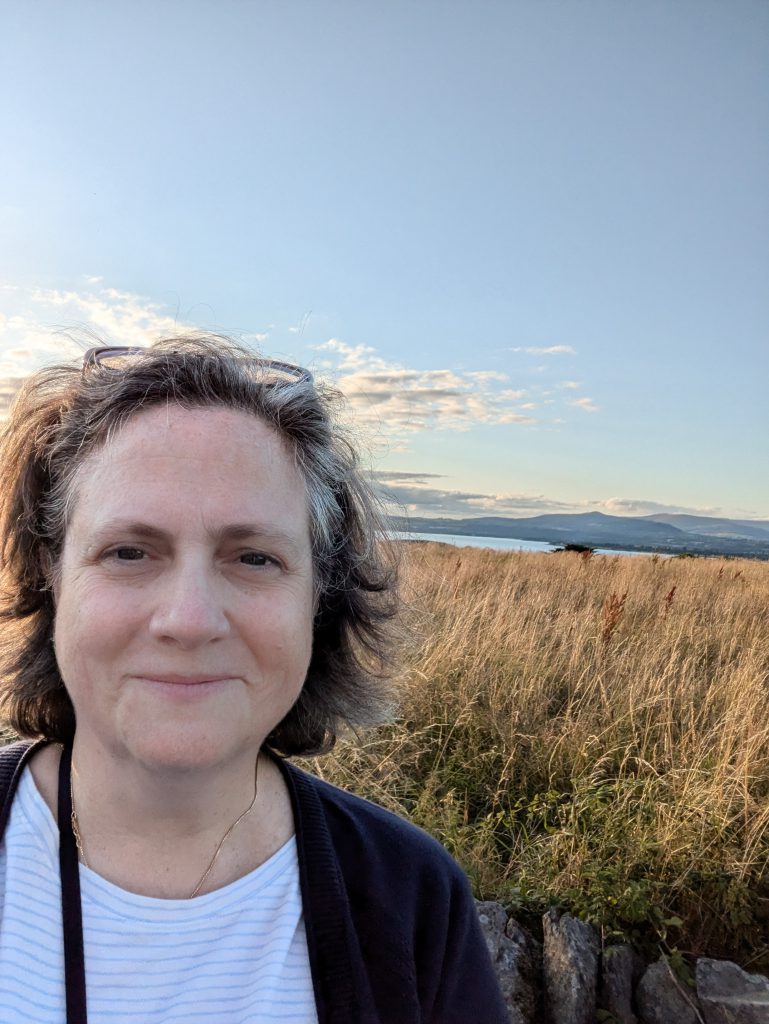
By Juliet Shires Recently, policy interns at Sahiyo have been interviewing members of the Connecticut (CT) Coalition to End FGM/C to learn more about coalition members’ important work toward policy creation on female genital cutting (FGC). In the first blog of the series, Sahiyo’s policy intern, Juliet Shires, interviewed the Executive Director of the U.S End FGM/C Network and CT Coalition member Caitlin LeMay. For this second blog, she talked to Joanne Golden, a member of the Sahiyo U.S. Advisory Board and an attorney working in Massachusetts. Juliet and Joanne discussed how listening to survivors and those from affected communities and her personal knowledge as a lawyer strengthens coalitions to more effectively pass holistic legislation. The Importance of the Lawyer-Survivor Partnership Joanne Golden’s journey as an activist working to prevent FGC started when she learned about the harmful practice and sought to pass legislation in Massachusetts to protect children from undergoing it, which eventually happened after seven years of advocacy efforts in August 2020. After being successful in Massachusetts, she began advising the CT Coalition to End FGM/C on how to do the same. She explains how meeting Mariya Taher, the Executive Director of Sahiyo U.S., and other survivors in 2015 changed her perspective on how to approach the issue of FGC as well as the understanding of her role as a lawyer within coalition work: “My mindset changed in that it wasn’t really about what I was doing [as a lawyer] but who we were doing it for.” Lawyers and lawmakers are needed to support the bill and get it passed through the legislative system as they bring the knowledge of how these systems work, but that work is meaningless without involving those communities and individuals impacted by FGC, the voices of survivors are needed to contribute to those laws, Joanne explained. “At the time a majority of people who [shared their stories] were at-risk were people of color, Muslim, and oftentimes immigrants. I fit none of those…My role wasn’t to put myself forward to ask all the questions. [It was to] let the survivors or to let people who could testify, [like doctors with medical/professional relationships to survivors,] take charge in those situations…It was saying how can I use my knowledge and my experience (as a woman and a lawyer) to protect the vulnerable. The question is how to apply that.” Joanne recognizes how in her role as a lawyer she must be especially culturally sensitive when approaching FGC given that it is often a deeply rooted practice in many different cultures. “I think first of all it’s important to have some humility and to understand that you do not know everything [as a lawyer]…you come at it from one aspect and say how can I use my knowledge and experience as a human and a woman [to help]? I know the law and how it’s meant to work, but the question is how to apply that.” Being humble also involves educating yourself, according to Joanne. It demonstrates your capacity to learn and listen to survivors of FGC to make the work you do more effective. On that note, Joanne contacted the Islamic Cultural Center in Boston and spoke to the Imam about what could be some ways to best approach FGC-impacted communities: “How can we get the message across that FGC is not necessary, not from a religious point of view, not from a legal point of view? And how to make people comfortable with the idea that they can abandon this practice for their benefit? Those are the tough conversations to have…once I was knowledgeable enough to make those arguments, I stepped forward and I thought I could be an advocate to help educate others.” Overall, Joanne stresses the importance of carefully crafting bills so that “people don’t get to use the law for their own agenda.” For example, the Massachusetts coalition reached out to GLAAD, an LGBTQ advocacy organization, to rephrase the bill on FGC so that it didn’t conflate gender-affirming surgery with FGC, and also make the former illegal. Joanne says lawyers provide the expertise and knowledge to ensure legislation is not written in a way that could bring about unintentional harmful consequences without people realizing it. Misconceptions Around FGM/C and the Law Since FGC is often connected with ideas of religion amongst some practicing communities, Joanne explains how some pro-FGC individuals believe that FGC should fall under the First Amendment as freedom of religion. “[People think that] the First Amendment protects religion. And it doesn’t protect religion, it protects your practice of your beliefs. It protects the individual. So, in understanding that [FGC is] not rooted in religion, it was a social practice and therefore we would not be denying someone’s ability to practice their religion or their faith…it has to do with more than religion…Really, what you’re talking about is a way to suppress a woman’s sexuality.” Joanne explains that to successfully pass state legislation on FGC, an American perception, one emphasizing the individual rather than the collective, can be helpful. “There’s a perception in the United States that we’re all about the individual and not about the family and not about society [which differs from other democracies across the world]. I think learning how to say that what you’re doing is preserving society by protecting the individual is important… [FGC can be seen as] a way to suppress a girl’s individuality.” Joanne also illustrates the importance of understanding the American political context in passing laws by explaining that because the US government is based on a federalist system, there is a great need for FGC legislation to be enacted in every state. Particularly since the 2018 Michigan Case ruled that FGC was a criminal activity on the state level and that Congress had overstepped its authority to pass such a law in the manner that it had. “Because the federal law existed since 1996, people thought that was enough…they forget federalism. There are areas of the law that are exclusive to the federal government
Framing FGM/C: Understanding and Engaging with Cultural Sensitivity Event on August 22nd
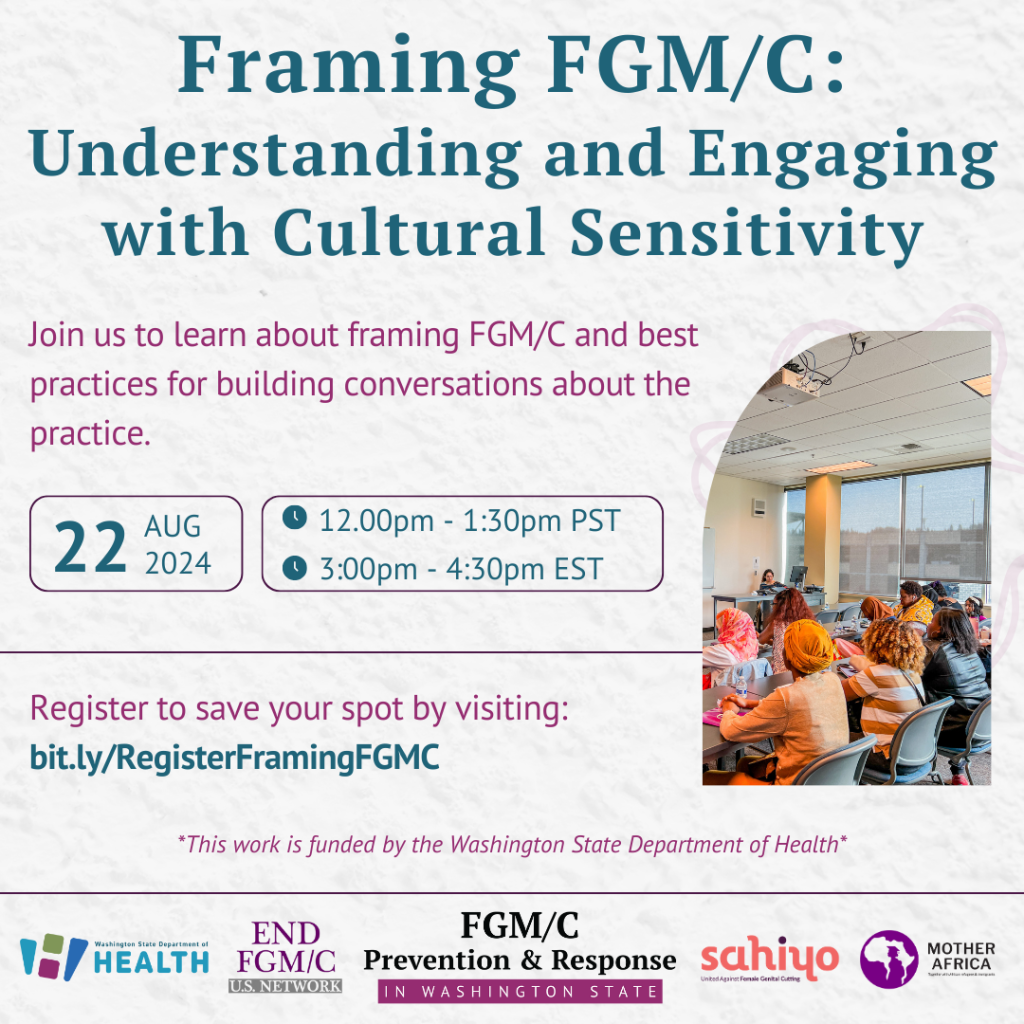
Sahiyo U.S. invites you to join our upcoming training session, Framing FGM/C: Understanding and Engaging with Cultural Sensitivity, on August 22nd from 12:00- 1:30 PM Pacific Time. This insightful and interactive event will empower you with the knowledge and skills to discuss FGC with empathy and respect, helping to foster trust and relationships between individuals and communities. What You’ll Gain: A better understanding of the types of FGC, the prevalence, and associated health risks of the practice. Insights into the cultural and social contexts that sustain this practice. Awareness of how framing FGC in discussions and media influences public perception and policy towards the practice. Best practices for having sensitive and respectful conversations about FGC. Who Should Attend: Healthcare professionals, social workers, community leaders, educators, advocates, and anyone interested in understanding and addressing FGC. Why Attend: Your participation will equip you with the tools to become a better advocate for the prevention of FGC and support for survivors, allowing you to make a meaningful impact in your community and beyond. For questions about this training or to learn more about the work being done to prevent and respond to FGC in Washington, email us at info@wafgmc.org. Register now!
The Connecticut Coalition to End FGM/C Interview Series: Caitlin LeMay

By: Juliet Shires Policy interns at Sahiyo have been interviewing members of the Connecticut (CT) Coalition to End FGM/C to learn more about them and their important work. Recently, Sahiyo’s policy intern, Juliet Shires, talked to the Executive Director of the U.S End FGM/C Network and CT Coalition member, Caitlin LeMay, about her personal experiences as an advocate as well as the Network’s role in supporting the CT Coalition’s efforts. Misconceptions Around FGM/C Caitlin LeMay initially echoed the same belief that is found amongst many Americans, particularly those who identify as white, that FGC is only a practice that takes place in African, Asian countries, or basically anywhere but here. “I’m surprised I wasn’t more familiar with it earlier…I think that it really speaks to what it’s like being raised in the US and the misconceptions around how FGM/C is not seen as an issue here. I was susceptible to those same misconceptions and miseducation about FGM/C and its impact in the United States. I think because of that…it fuels me even more to spread awareness and spread education about FGM/C [in the US]…I’ve really found a home here and a lot of passion for this work.”. Caitlin continued to expand on these common misconceptions surrounding FGM/C, making it clear that it is very much a practice that affects the U.S. In fact, American doctors used to perform FGM/C to treat perceived ailments such as “lesbianism”, masturbation, and hysteria. She points out that the first step to ending this practice is recognizing that these problems exist within the U.S. “The United States has a long history, and present…of practicing FGM/C in our medical institutions as a regular practice. And we are yet to reconcile with that… [It was an] institutionalized practice to control women and their bodies and their behavior.” These racial stereotypes only serve to perpetuate problems in the U.S. “The root of the US not reconciling with [FGM/C]… is completely rooted in racism and anti-blackness. Not being able to see what is happening here as FGM/C is all rooted in racism, xenophobia, and anti-Blackness. We need to call it what it is… Education is our best tool [to combat this], it’s where we’ve made the best progress.” The Network’s Role in the Connecticut Coalition to End Female Genital Mutilation/Cutting In our interview, Caitlin also explained how the Network helps the CT Coalition, using their experiences working with other state-based coalitions to guide fellow organizations and volunteers in the CT Coalition. They also make sure to tailor their advice according to the state, keeping in mind that their communities have the most knowledge of what their state needs and how to achieve their goals. “They know who would be the best representatives or senators to reach out to sponsor the bill, to champion them … Engaging the local communities to take the lead on that and really engaging them because they know best.” Leading through locals goes hand and hand with allowing survivors to take the lead in determining what their needs are and what resources they need to address them. In other words, to determine what would be best “not just for Connecticut but for survivors in Connecticut.” It is a collaborative effort that involves debating and discussing with one another to create a solution that works for all survivors with varying backgrounds and experiences. Caitlin’s and the Network’s ultimate goal is to ensure that state coalitions are safe spaces, where survivors can feel heard and have the power to make change in their communities. “There’s a place for everybody. No matter what your comfort level or what your capacity is, there’s a place and there’s a way to get involved.” Caitlin and the Network assisted in the passage of Bill SSD 5453 in Washington, a piece of legislation aimed at ending the practice of FGM/C in the state. She highlights it as a prime example “of what can happen when there are these state coalitions that are survivor and community-led.” The bill achieved the coalition’s goal of fostering collaboration between state departments and community members who best address survivors’ needs. Now that Washington state has started implementing the bill, Caitlin hopes that Washington can become an example for other states passing new legislation around FGM/C: “We haven’t seen that before, so I think it’s such a great example and could really provide an example for other states. We really hope that other states see this and learn from it.” Throughout our conversation, Caitlin highlighted the importance of the progress in Washington state, and how it relates to the work that still needs to be done in Connecticut, and across the country. She also validates how disappointing and frustrating it can be when states like Connecticut don’t prioritize legislation around FGM/C but knows it’s also important to recognize that “we didn’t go backward, we just didn’t go forward.” Furthermore, it’s important to take a step back and look at the larger, global movement toward ending FGM/C and that’s something that can help encourage and provide us with hope. Still, she encourages anyone passionate about the issue of FGM/C to get involved in advocacy work as there’s work to be done all across the US – even in states that already have a law in place. “It’s all connected. Progress that is made in CT helps the movement in The Gambia. Progress made in The Gambia helps movements in Europe or Asia… Any glimmer of progress that we can find can help get us to tomorrow, and get to the next day, and keep us moving forward to that ultimate end goal of ending FGM/C globally.” We would like to thank Caitlin LeMay for taking the time to sit down with our policy intern and for her continued work with the CT Coalition and the U.S. End FGM/C Network. About The U.S. End FGM/C Network As a member of the Connecticut Coalition, the U.S. Network helps support the coalition’s efforts using the resources it possesses as a national organization.
Sahiyo’s Outreach at Townview High School
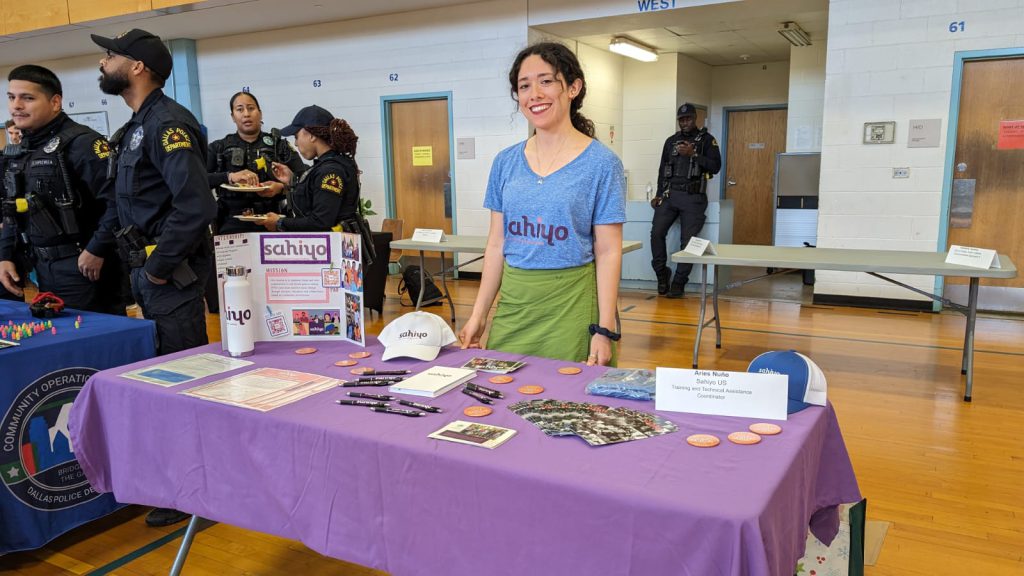
On February 23rd, Sahiyo had the opportunity to talk to students at the Townview High School Career Fair in Dallas, Texas. Our Training and Technical Assistance (T&TA) Coordinator, Aries Nuno, provided information about Sahiyo’s mission to end FGC and offered a glimpse into the workings of NGOs. The event allowed us to educate students about the impact of FGC and the importance of community involvement in addressing such issues. We presented various ways for students to contribute to this cause, including volunteering with organizations like ours, participating in educational initiatives about FGC, and encouraging conversations about the practice in their circles. It was encouraging to see how interested students were in learning more about social issues and how they can be part of the solution. We appreciate the chance to have been part of this career fair and talk to young individuals about making a difference through NGO work. We thank the staff and students of Townview High School for welcoming us and look forward to future opportunities to engage with the community. Whether in-person or online, if you are interested in inviting Sahiyo to your next career fair, community event, or classroom to talk about our work and how to get involved, email us at aries@sahiyo.org!
